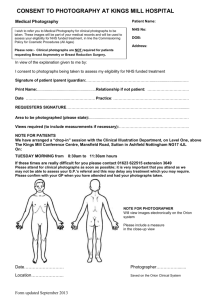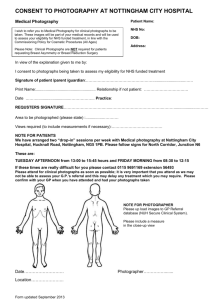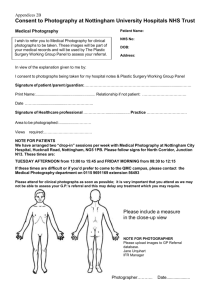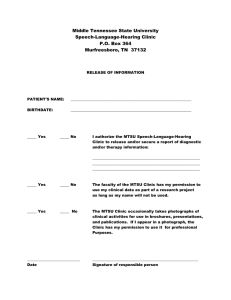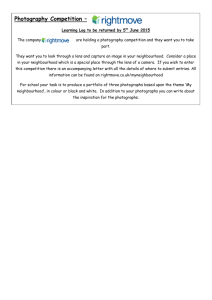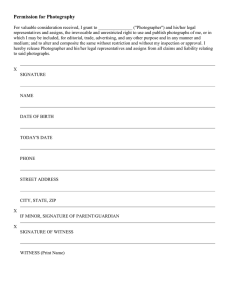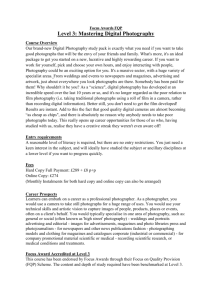Explain more
advertisement
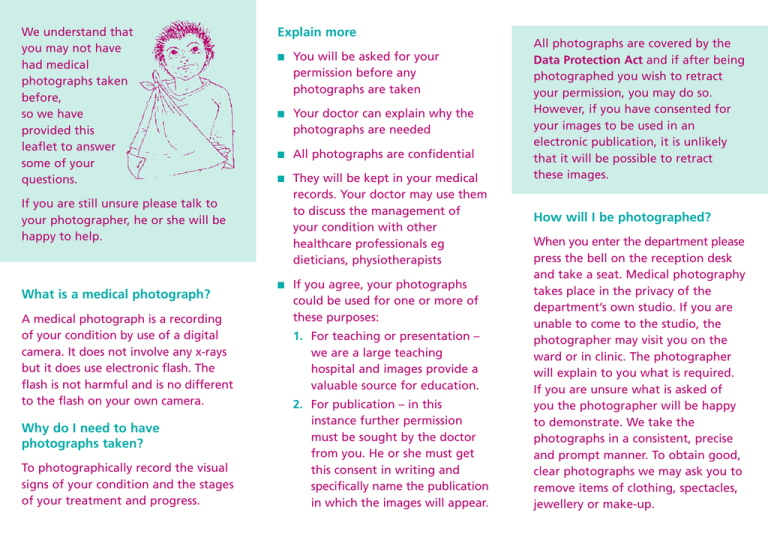
We understand that you may not have had medical photographs taken before, so we have provided this leaflet to answer some of your questions. Explain more n n n n If you are still unsure please talk to your photographer, he or she will be happy to help. What is a medical photograph? A medical photograph is a recording of your condition by use of a digital camera. It does not involve any x-rays but it does use electronic flash. The flash is not harmful and is no different to the flash on your own camera. Why do I need to have photographs taken? To photographically record the visual signs of your condition and the stages of your treatment and progress. n You will be asked for your permission before any photographs are taken Your doctor can explain why the photographs are needed All photographs are confidential They will be kept in your medical records. Your doctor may use them to discuss the management of your condition with other healthcare professionals eg dieticians, physiotherapists If you agree, your photographs could be used for one or more of these purposes: 1. For teaching or presentation – we are a large teaching hospital and images provide a valuable source for education. 2. For publication – in this instance further permission must be sought by the doctor from you. He or she must get this consent in writing and specifically name the publication in which the images will appear. All photographs are covered by the Data Protection Act and if after being photographed you wish to retract your permission, you may do so. However, if you have consented for your images to be used in an electronic publication, it is unlikely that it will be possible to retract these images. How will I be photographed? When you enter the department please press the bell on the reception desk and take a seat. Medical photography takes place in the privacy of the department’s own studio. If you are unable to come to the studio, the photographer may visit you on the ward or in clinic. The photographer will explain to you what is required. If you are unsure what is asked of you the photographer will be happy to demonstrate. We take the photographs in a consistent, precise and prompt manner. To obtain good, clear photographs we may ask you to remove items of clothing, spectacles, jewellery or make-up. Who will photograph me? How to find us You will be photographed by a qualified member of staff who has been specially trained in medical photography. There are both male and female photographers; if you prefer to be photographed by a photographer of the same sex, you just have to ask. If one is unavailable, an appointment can be made. You can be accompanied by a relative or friend, or we can provide a chaperone. Patient photography is situated in the medical illustration unit and can be found on the first floor, opposite clinic 9. Clinic 1 Clinic 4 Stairs and Lifts Clinic 2 Blood Tests Clinic 5 Clinic 3 Medical Illustration Clinic 6 Clinic 9 Patient Photography How long will I have to wait? You will usually be seen soon after you have entered the department. You may have to wait if the photographer is busy attending to another patient. Patients are seen in the order that they arrive. Our aim You may feel apprehensive and embarrassed and our aim is to make you feel as comfortable as possible. We will use our skill and discretion to guide you through your photographic session. Clinic 10 & Pre Assessment Lifts Stairs Lyndhurst Rooms Lifts Opening times Monday to Friday – 9.30am to 4.30pm Contact details Direct line 020 7830 2357 or ext 3600 Design & illustrations by revised 2005 © Royal Free & University College Medical School, (Hampstead Campus) www.royalfree.nhs.uk Medical Photography Patient Information
